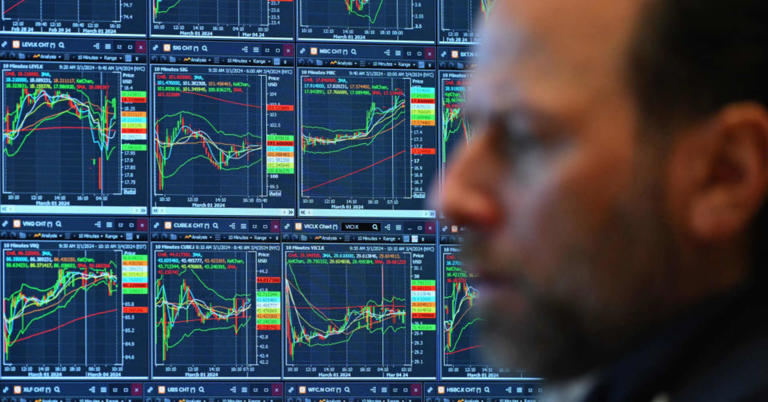Today’s financial landscape showcased a nuanced performance across major indices, reflecting both resilience and volatility in global markets. The S&P 500 and Dow Jones Industrial Average managed to edge into positive territory, albeit modestly, while the Nasdaq Composite, fueled by an impressive 18.6% year-to-date gain, posted a solid 0.49% increase. The day unfolded with Nvidia initially facing fluctuations but ultimately securing marginal gains following a notable 7% surge in the previous session. Investors closely monitored Federal Reserve communications, which influenced a rise in the yield on the 10-year Treasury, alongside anticipation for forthcoming inflation data slated for release on Friday. Meanwhile, escalating tensions in the Middle East drove U.S. oil prices higher, adding to market uncertainties.
In stark contrast, Micron Technology experienced a nearly 8% decline in after-hours trading after its revenue forecast for the current quarter, aligning with analysts’ expectations at $7.6 billion, failed to surpass market anticipations. Despite this setback, Micron’s CEO Sanjay Mehrotra highlighted the company’s robust performance in AI-driven products and a significant 50% quarter-to-quarter growth in its data center business, underscoring optimism amid volatile market conditions.
Amazon made headlines by surpassing a historic milestone with a market capitalization exceeding $2 trillion, placing it in the prestigious league alongside tech behemoths like Apple and Microsoft. This achievement was propelled by a remarkable 26% surge in Amazon’s stock price year-to-date, outpacing the Nasdaq’s broader 18% increase. The e-commerce giant’s strategic response included plans to launch a discount store, aimed at fortifying its competitive stance against formidable rivals such as Temu and Shein.
Southwest Airlines adjusted its second-quarter revenue forecast downwards, citing challenges in adapting revenue management strategies to recent booking trends. Despite this revision, the airline remained optimistic about achieving record quarterly operating revenue. However, activist investor Elliott Management reiterated calls for leadership changes, criticizing Southwest’s management for purportedly failing to adapt effectively to the evolving dynamics within the modern airline industry amidst rising costs and expanded capacity.
Across Asian markets, trading sessions witnessed declines, with Japan’s Nikkei 225 and Hong Kong’s Hang Seng index leading the downturn. The weakening of the yen to a 38-year low against the U.S. dollar prompted concerns about potential economic repercussions in Japan. Conversely, in India, Causeway Capital Management maintained a bullish outlook despite unexpected election outcomes, advocating for strategic investments in ETFs positioned to capitalize on potential market upswings.
In automotive sector developments, Volkswagen’s substantial $5 billion investment in Rivian underscored the industry’s accelerating shift towards electric vehicles (EVs). Rivian’s stock surged impressively by 23%, signaling investor optimism amid ongoing industry challenges during what analysts have dubbed the “EV winter,” characterized by tepid consumer demand and intensified competition. Meanwhile, Waymo expanded its robotaxi service to all users in San Francisco, contrasting with General Motors’s Cruise division, which faced leadership changes following operational challenges and public scrutiny over the safety of autonomous vehicle technologies.
Tesla continued to command attention as it navigates delays in launching its much-anticipated robotaxi service, despite CEO Elon Musk’s ambitious projections envisioning a potential $7 trillion market opportunity. Musk’s earlier promises for fully autonomous driving, originally slated for 2018, remain unfulfilled, amplifying scrutiny amidst industry-wide advancements and regulatory scrutiny.
Amidst the backdrop of heightened enthusiasm for artificial intelligence (AI) technologies, Wall Street adopted a measured approach as investors weighed profit-taking following Nvidia’s surge-driven gains. Amidst these deliberations, cautious sentiments prevailed, with strategists cautioning about the potential for a correction in the S&P 500 over the summer. CNBC’s Sarah Min delved into the factors underpinning projections by Citi and recent upgrades across diverse sectors.
Overall, today’s financial updates underscored the dynamic interplay of global economic conditions and industry disruptions, influencing investor sentiment and strategic decision-making across markets worldwide.
